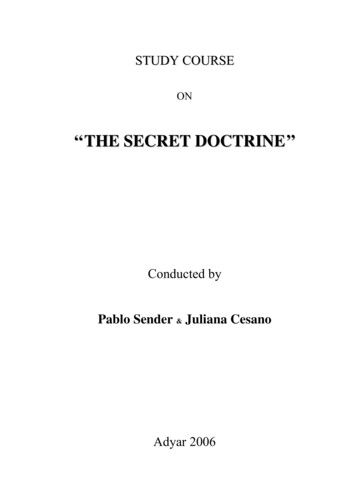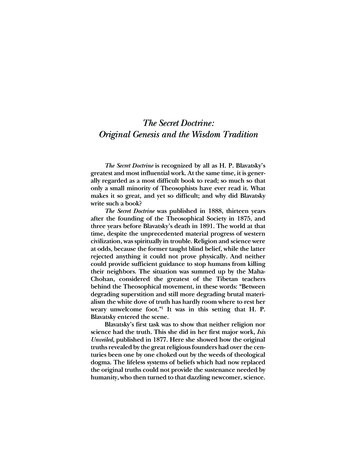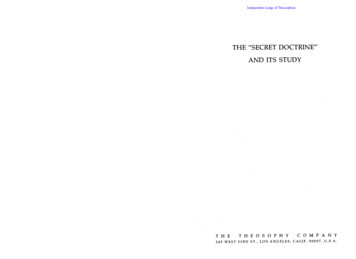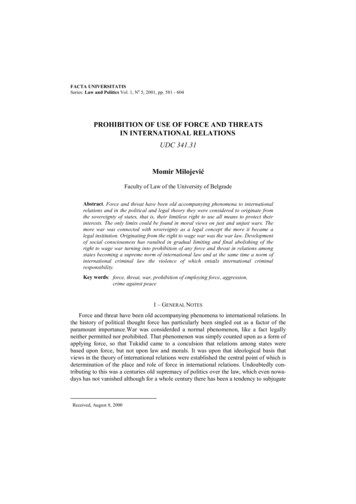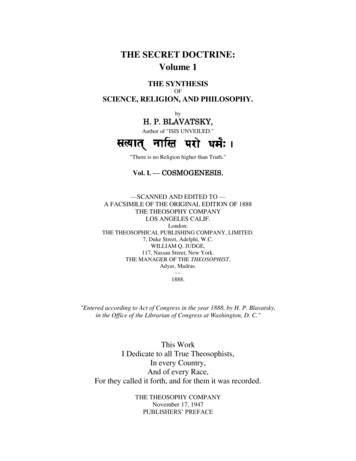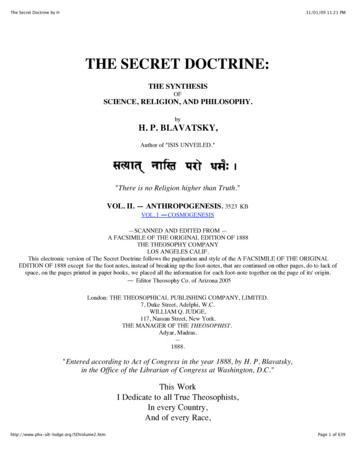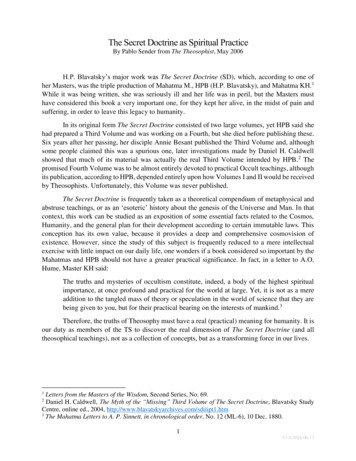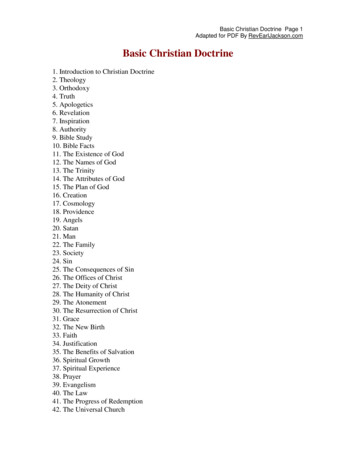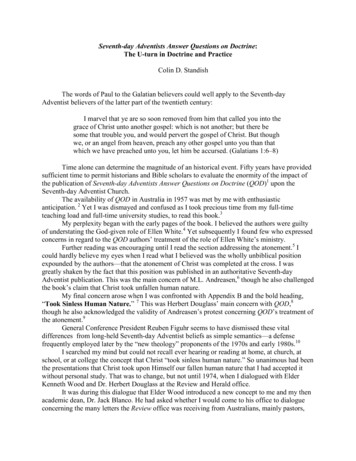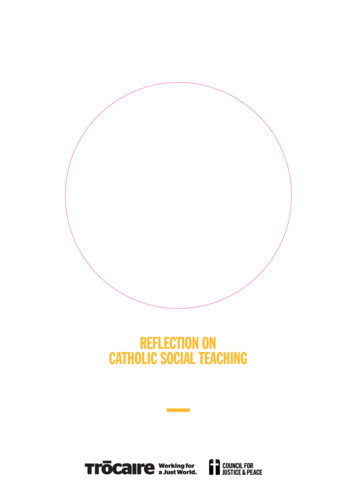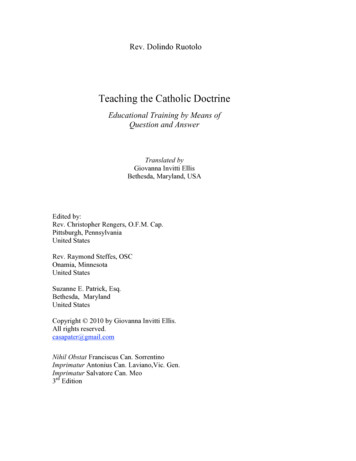
Transcription
Rev. Dolindo RuotoloTeaching the Catholic DoctrineEducational Training by Means ofQuestion and AnswerTranslated byGiovanna Invitti EllisBethesda, Maryland, USAEdited by:Rev. Christopher Rengers, O.F.M. Cap.Pittsburgh, PennsylvaniaUnited StatesRev. Raymond Steffes, OSCOnamia, MinnesotaUnited StatesSuzanne E. Patrick, Esq.Bethesda, MarylandUnited StatesCopyright 2010 by Giovanna Invitti Ellis.All rights reserved.casapater@gmail.comNihil Obstat Franciscus Can. SorrentinoImprimatur Antonius Can. Laviano,Vic. Gen.Imprimatur Salvatore Can. Meo3rd Edition
Table of ContentsFirst Recommendation . 4Second Recommendation .5Introduction 6First Instruction .9General Exhortations – Introduction to CatechismSecond InstructionThe Holy Sign of the Cross .16Third InstructionWho created you? God created us .24Fourth InstructionWho is God? God is purest Spirit, most perfect infiniteCreator and Possessor of all things 31Fifth InstructionIs there more than one God? No, there is only one God. Does God have a body like ours?God does not have body or shape because He is pure Spirit.Where is God? In heaven, on earth and everywhere .40Sixth InstructionHow many persons are in God. Why these three persons are perfectly equal.Why they are called Father, Son and Holy Spirit. Why we invoke Them 48Seventh InstructionThe purpose of man. The original sin.The incarnation of the Word, Jesus Christ . 58Eight InstructionDeath. The particular judgment. The last judgment. .68Ninth InstructionHeaven. Hell. Purgatory 78Tenth InstructionThe faith. The Catholic Church. The Creed .89Eleventh InstructionChristian hope. Divine grace. Love of God. Love of the other 99Twelfth InstructionPrayer. The Our Father. Devotion to the Virgin Mary 109Thirteenth InstructionThe Law of God. The Commandments. The first three Commandments of the Decalogue 121Fourteenth InstructionThe other Seven Commandments of the Law of God. The Precepts of the Church .1322
Fifteenth InstructionSin. The nature of sin. The consequences of sin.How and in how many way it is possible to sin 146Sixteenth InstructionThe Holy Sacraments in general. Baptism, Confirmation, Last rites, Holy Ordersand in particular the Sacrament of Marriage . 158Seventeenth InstructionThe Sacrament of Penance (or Sacrament of Reconciliation) 172Eighteenth InstructionThe Most Holy Sacrament of the Eucharist 190Short Biography .2083
First RecommendationDear Reader:I feel honored to have been asked to help with the English translation ofLA DOTTRINA CATTOLICA by Father Dolindo Ruotolo.There is no doubt in my mind that Father Dolindo was specially calledto do this work of apostolate. He had a deep personal spirituality that madeevident in his teaching. Although well educate theologically, he had the abilityto share his faith with the young people he reached out. I am especially struckby the understanding and sensitivity Father Dolindo exhibits in his teaching. Iam personally grateful for the richness I received in my reading and studying ofthis fine book LA DOTTRINA CATTOLICA.May these instructions bring many more to a finer appreciation and loveof their Catholic faith. Especially the young people who are in such great needof guidance.May God give His richest blesses to this book and continue the goodwork He has begun.Fr. Raymond Steffes, OSC (First Editor)MAY 26, 2010 Pentecost Sunday********Fr. Christopher Rengers OFM Capp., my loving editor for years died onJanuary 25, 2010. He was 93 years old. Father Christopher was always veryhelpful and supportive to me. A capuchin friar wrote me: “Fr. Christopherpassed away doing this work on his death bed .” Fr. Christopher loved DonDolindo. After editing “Gesù pensaci tu” (Jesus, you take over), he asked toreceive corrected copies to give to people in need, including his sick brother.*********Msgr. E.J. Filardi, Pastor of Our Lady of Lourdes Church in Bethesda, MDwrote: “I want to thank you for the copy of the wonderful marvel “Teaching theCatholic Doctrine”. It is beautifully done and will be a great help to me (toreceive the printed copy) especially as I visit our school children. It iswonderful you were able to translate it. Brave. With gratitude,Msgr. Edward Filardi*********4
Second RecommendationI am a cradle Catholic and the mother of four young children, whom myhusband and I are doing our best to instruct in the Catholic faith. We send themto Catholic schools but we are their first teachers. Therefore, we teach them asmuch as we can at home. First, we strive to teach them by example. But as St.Francis of Assisi said, sometimes we must use words.For this reason, I have very much enjoyed and relied upon the beautifulinstructions of Don Dolindo. The instructions are easy to read and the tone isconversational, exactly as one talks to one’s children. So it is possible to put hisinstructions immediately to use. I love the analogies he makes, such asexplaining the change at the consecration in the bread and wine by likening it topetrified wood, which retains the appearance of wood but is actually marble.What a brilliant analogy to explain to children, but also to adults.Unfortunately, my generation was so poorly instructed in our Faith.Many have fallen away from the Faith they never really received. To me, this isthe true helpfulness of Don Dolindo’s Instructions: it is we parents who needthe instruction. We are the ones who need to learn our Faith. These instructionsvery patiently and vibrantly, through the analogies, teach us.I highly recommend them to any parent. I believe everyone will findjewels in these instructions, gems which will not only strengthen their faith butgive them words and images to explain their faith to children and to defendtheir faith, which is constantly under attack.Suzanne E. Patrick, Esq.May 26, 2010, St. Philip Neri5
INTRODUCTION1.There is nothing more difficult and complex than to teach the Catechismto children. Their little minds, only recently opened to life, have the perceptionand knowledge of few facts, very often mostly material. They see and checkoutwhatever may surprise them. At first sight, it seems impossible for them tounderstand the great supernatural truths of the Catholic Catechism. By naturethey are inattentive, they love to cause excitement and they take no interest inthis teaching when it is done in an oppressive and arid way. It only tormentsthem. Most of the time that hour of Catechism seems to them like a century.They are compelled to listen and repeat formulas they do not understand. Theyare bored and do not want to go to Church anymore.This explains why religious education classes start very big and at theend no one comes anymore.2.To avoid this problem, many give out rewards or have fun things to do,but to no avail. The child is not interested as people think; he should be wherehe feels he can be himself, where he can have a conversation in tune with hisage. Experience has shown this over and over again. A short story that awakenshis interest, or amuses him, and makes him understand that whoever is speakingto him treats him like a son (this has a powerful appeal on him because of thelove, intimacy and good nature he feels he is receiving) is much better than areward, a fun thing to do, which are for him, the cost of his presence.3. It is evident that the child must not only learn the Catechism, he needs toreceive a Christian formation from the earliest years of his life. If the very firstnames he learns to speak are those of his father and mother, because they gavehim life, even more important his First Communion must be with the God, whocreated him.There is a great stupidity on the part of those unbelievers who claim thatchildren do not need to know God until they can freely choose their own faith:the knowledge of the true faith is the strictest duty of a person. It cannot be leftto a personal choice, as if it was a profession or a taste to be acquired.What is necessary to achieve with Catholic Education is precisely toorder the direction of the child’s soul to God. The child needs to know Him, asmuch is possible for his little mind. He must love him as a Father. He mustlearn the duty of practicing the Holy Laws: that is, he must become a Christian.Hence he must understand what is being taught to him. He must acquire an6
interest in it and, almost without realizing, it must become the drive of hisinterior life.It is so easy, nowadays, to hear speculation about the faith. Many timescatechists themselves are the traitors of the children’s innocence. It is necessarythat the child understands that what he learns is the truth; that he needs to havethe highest esteem for what he has learned and keeps it in his heart and mind ashis heritage. Hence it is not enough to have a child memorize formulas but it isnecessary that he understand them. God himself participates with his Grace inthis wonderful enterprise, because He does not refuse anything to little innocentsouls.4.The surest method for the children to understand the truths of faith iswith parables and comparisons. Parables, in fact, and comparisons, are like alittle play that takes place in the fantasy of the mind of the child. The childenjoys it, takes an interest in it, he thinks about it and, when he has to apply it,he already has understood the truth then he can apply it more easily.The parable usually must be taken from the everyday life of the child orfrom whatever comes in his life as daily experiences. In so doing, not only hedoes pay more attention to it, but also he remembers it during the day if theoccasion arises.It is necessary that the little story be told with lots of details, so that thechild may have an opportunity to intervene in the story and can say what hethinks about it. In this way the description becomes more interesting and theapplication becomes much easier. Moreover, it is necessary to follow, withoutshowing it, a rigorous psychological order that leads to a perception of ideasand truth that is more hidden and difficult.Once the truth has been broken into small pieces and made it clear, theformula to be memorized shall not be boring anymore and without makingsense, but it will be the summary of many thing that have interested and amusedan innocent soul.5.Never be in a hurry in teaching the Catechism. If a child learns only onetruth and learns it well, it is already enough for one lesson. It would bebeneficial to have him repeat what has already been told in order that he maynot forget it. A truth deeply impressed in the mind and in the heart cannot bewiped out anymore and even when the tempest of evils will storm over thesetender hearts, the beneficial truths shall sprout again, because of the firm rootimplanted in their hearts.7
6.Briefly, the person who teaches Catechism in order to have success inthis important duty, must remember:1. He must pray a lot, because without the divine assistance he will not be ableto succeed.2. He must give good example in everything, without falling into impatienceand anger when he teaches.3. He must love the children whom he teaches, without showing any partiality.He can do it praising them or giving them small rewards not as prizes for theirpresence, but because he loves them.4. He should treat the children with the utmost respect and professionalism,avoiding being rude when he gives corrections.5. He should treat people kindly but without needless familiarity; a holysuperiority, softened by humility and respect, is the secret of being reallyappreciated by children as their superior.6. He should not correct too often and he should pretend not to notice certainsmall offenses; often nagging and persisting in correcting, stirs in the child theimpulse that causes in him the wish to make disturbances.7. The catechist must raise well his voice when teaching doctrine, to make thechildren listen to him; a voice too deep or too slow puts his listeners to sleepand even wears out their nervous system.8. His method of talking should be casual, often repeating the same things, thatit may remain imprinted in their minds, even using slang where necessary.9. He must maintain an absolute reserve with little girls, unless the catechist is awoman. Some of the expressions in this book should be adapted, according tocommon sense, when talking to young women.10. Finally the catechist should make the children accustomed to mutual respectand politeness. It is not possible to form a good Christian without also giving tothe children a civic education, especially if they are socially or economicallydisadvantaged.7.The following instructions are more a model than a definitive way ofteaching. The person who wants to make use of this book should know theenvironment of the children to whom he speaks. The instructions can beadapted to any manual of catechism for children. They are written in a practicalway as if talking to a group of innocent little children. Only in this way can thevalue of some expressions be appreciated.8
FIRST INSTRUCTIONGeneral Exhortations – Introduction to Catechism1. Enter the Church without making noise and with your best manners.My dear young people, I saw you entering the Church making a lot of noise, and I feltcompassion for you because you are still very young. But tell me something: is the Churchthe house of God or is it your house? It is the house of God. And since it is the house ofGod how should we enter: making noise or silently? Silently. I want to tell you a littlestory. The other day the newspaper man, who delivers the morning paper, because hisregular boy had not come, called another boy and asked him: “Do you know how to go tosuch and such place?” “Sure I can”, he answered with a laugh and off he went. He came tomy house and I went to open the door. He came in and singing to himself moved about myhouse. “Boy, what are you doing?” I asked. The boy looked at me in surprise. “I amsinging”, he answered. I showed him out the door. Did he have good manners or not? No,he had bad manners. Why? Because he entered singing and moved about my house as if hewere in a public place. If he had been in a public place there would have being nothingwrong with his behavior and he would have been free to do as he pleased. Now the Churchis the house of God and should we enter joking around or silently? Silently. And the child,who talks aloud, pushes his friends, asks questions, is he good or bad? He is bad; he isuneducated.Well then, listen to me. When you come to Church, you must not come as if playingaround but to learn the truth of our faith. The one who comes to make noise and does notpay attention, is does he have good manners or bad manners? He has bad manners.2. First you greet Jesus and then you greet others.Once I knew a boy who was very rude. When he went to someone’s house, he wouldsit on the first chair that he found and stay there with a scowl on face. One day I askedhim: “My little friend, did your father hit you, to have that face and sit here like this?” Hedid not even answer me. He got up and left without saying a word. He had come to see mymom and he did not even say “hi” to her! Did he act well or badly? He acted very badly. InChurch who is the master of the house? It is Jesus Christ. Well then, when a person comesto Church, the first thing he should do, after he has dipped his hand in the holy water, mustbe to greet Jesus. Do you see the candle lit in front of the altar of the Blessed Sacrament? It9
is a reminder that inside the Tabernacle there is Jesus himself. You cannot see Himbecause He is hidden and He is inside the Tabernacle. However, as you enter the Church,Jesus looks at you and smiles at you and kisses you from far. Now if you do not greet thegood Jesus, is he happy or unhappy? He is unhappy because He loves you. Jesus is hiddenthat you may not be uneasy in front of Him, but He is truly alive, in body and soul, bloodand divinity. Well then, the first thing to do is to welcome the good Jesus. You must bendyour knee in front of Him and say: “Praised be Jesus Christ!” Now, let us say that there is astatue of St. Therese the Little Flower near the entrance of the Church. Whom should youwelcome first: St. Therese or Jesus. First you have to welcome Jesus. St. Therese, the LittleFlower is a great saint, but who is greater, St. Therese or Jesus? Jesus is greater and muchmore beautiful. When you enter a house, who do you greet first, the master of the house orhis servant? The master of the house. Now, you see, Jesus is the master of everything andwe must greet Him first. Besides, Jesus is here truly alive and as for St. Therese there isonly a statue that represents her. And when you go in a house, whom do you greet first themaster of the house or the picture of an uncle that hangs on a wall? First you greet themaster of the house. What would you think of a child who enters a house and bows in frontof a picture, turning his shoulder to the master of the house? This child would be rude andhe has bad manners.Well then, when you enter a Church, first of all welcome Jesus and after Jesus, theHoly Virgin and the Saints you most love. The Priest is the minister of Jesus; now whoeverloves Jesus must also love his Priests, am I right? How do you greet a Priest? You greethim respectfully, even by like your superior.3. Do not talk with the other school friends, do not talk all together, and ask permissionbefore speaking.A maid was asked by her lady to go shopping. “Take a bag with you”. She takes a bagand goes off to an open market. You know how the open markets are; somebody sells fish,or fruit or vegetables or other things. Everybody is busy. The maid goes to the stall of theone who sells fish and asks: “How much does this fish cost?” But the man does not payattention to her because he is busy talking to someone else about a good sale. She insistswith impatience: “Listen, I cannot stay here all day, my lady will scold me”. But the mancontinues to talk now with another man who just went by his stall, and still does notanswer her. Tell me, when someone is distracted and goes on talking with other persons,can he listen to the person who stands in front of him and who asks him a proper question?Certainly not.10
And so, never talk with each other when I explain things to you, otherwise you cannotunderstand what I am saying. If you need to ask a question, raise your hand before talking.Only in case I ask a question of the whole class, only then you can answer all together.4. Good manners, diligent, the best class.“Dearest children, do you love me or not?”“We love you”. I also love you very much and for this reason I love to teach you theholy things of the faith. Since you love me, you do not want me to lose face in front ofothers; well then, you have to be quiet, attentive and give good example and everybodywill say: “What good children they are!”5. The need of Catholic Doctrine. If a person does not know the truth of our faith, he isa person useless and dangerous.Have you ever seen a donkey in a stable? Yes/No. Well, he is like a fool, poor donkey.The donkey does not understand anything and does not know how to say anything, excepthis own bray. His mouth is always turned toward the ground to look for something to eatand when he is tired he stretches himself on the ground and sleeps. Early in the morninghis master goes to fetch him and ties him to the cart. For food he has a little hay and herbs.Would you like to live like a donkey? “No!” Well then, if a child does not know the truthsof the Catholic Doctrine, he becomes like a poor donkey: sleeps, eats, is hit, and does notknow how to do anything.We are creatures of God because He created us; we must know Him and we need to knowall the truth that concerns Him. Otherwise we become great fools.Listen, if for instance I come in and ask a boy:“What is your name?” The boy remains silent and does not answer.“Well, - I say – you do not know your name?”And the boy answers: “I don’t know”.“And your father, what is his name and who is your mother?“I am the son of dad and mom.”“Well, this is good news, but what are their names?”“I don’t know”“What did you eat today?”“I ate some food”“Which food?”“I don’t know.”“Would you know how to bring me to your house or tell me how to get there?”“I don’t know, for my mother comes to pick me up.”11
What would you think of this boy? You would say that he is stupid because he does notknow the name of his parents and does not know about his house or how to get there.Well, even more stupid are those children that do not know God, who created them;who do not know the things of heaven, their true home, and do not know how to get there.You come here to study Catholic Doctrine, to know God, to learn the truths that will leadyou to heaven after you die, and if you do not want to make a fool of yourselves, learn verywell all these beautiful truths.6. Whoever does not learn the truth of our faith lives like a pauper. He is like a hungryperson.Tell me, my dear children, what is it more important: the tomato sauce you put on thespaghetti or the spaghetti? The spaghetti is more important, because the tomato sauce willnot satisfy your hunger. What would you say of a person who does not eat his spaghetti butonly drinks its sauce? He would be hungrier than before. And what do you like best to eat,the orange or its peelings? The orange. And if a person would eat all the orange peelings ofall the people eating at his table and then say: “I got more nourishment than anyone ofyou.” Wouldn’t you say that he is stupid? Of course he is. Now if a child goes toCatechism but never learns because he does not pay attention, you can say that he haseaten the orange peelings and not the orange.Do you go to school? Yes. Who is more knowledgeable your school friends or theteacher? The teacher. Then we have to pay attention to the teacher, because we are not hereon earth to eat and drink but we must learn to work and live for God. If we fail to knowGod, we are useless people.Sometimes we see very young children. They believe that everything is for eating: thefork with which they feed themselves, the napkin, even their own little shoe, if they take itoff of their foot! Now, tell me, would that child be nourished if he eats a fork, a napkin, hisshoe? No.The people who live without knowing the truth of our faith are like those little children.They believe that everything is for eating in life and, apart from eating and drinking theydo not care about anything else. However when someone overlooks the supernatural truthsto allow its soul to be nourished, the soul remains empty and he becomes good-for-nothingand evil. In other words, it is not enough to go to the Catechism class. We must learn howto live without committing sins and to learn to talk to God.7. Whoever does not know the things of God wastes his time on earth.A boy goes to a shoemaker to learn how to make shoes. He will receive a little stipendfor it. He sits down near the shoemaker who has all kinds of tools next to him. The boy,instead of looking at what the man is doing, to learn how to make a shoe, picks up a pair ofscissors and a piece of leather and starts to make a little airplane. The shoemaker yells athim. “You lazy boy, do you think that your mother has sent you here to play or to learn a12
trade?” The boy shouts back: “I am not lazy! Don’t you see that I am doing something?”“What you are doing is worse than being lazy. You are using my tools to make this uselesslittle airplane.” The boy shrugs his shoulders and continues to do what he wants. In theevening he goes back home and his mother happily asks him: “How did it go?” The boysaid: “I worked all day! I never rested a minute!” His mother is happy and she asks: “Whatdid you do?” The boy very proudly shows to her all his little airplanes. “What? - Themother said – “You made those little airplanes? You wasted all your time for that? Did hepay you?” “No – the boy said – he did not pay me at all!” Poor boy, he worked all day andbecame very tired but he wasted all his time and received no money for it! It would havebeen much better for him if he had learned at least a little bit of the shoemaker’s trade!My dear children, we live on this earth and we move, we come and go, we work and soon, but we came on earth to love and to serve God; if we do not learn and do the things ofGod, we waste all our time. At the end of the day, God cannot give us anything, becausewe have done nothing.If that boy had learned at least a little bit, besides doing his little airplanes, he wouldhave made his mother happy, instead of receiving a good spanking from her. A man thatdoes not learn to love and serve God on earth, but goes instead on his own way with hiswork, with his studies and whatever he wants to do, is like that boy who made all thoseuseless little airplanes which only one day will add to his sentence!8. The person who knows all the science of the world and does not know God is alwaysignorant.Listen to this other little story. A lady interviews a maid and asks her: “What is yourname?” “My name is Theresa” “Did you work in a family before?” “Yes, I did and I amvery good.” “Well then, I shall give you 400 per week. Are you glad?” “Very happy”.The lady told her to go to the kitchen and cook penne alla genovese (a recipe with pastapenne and meat). The maid goes to sit down by the window and starts to do some sewing.The lady goes to see what she is doing and is surprised. “What are you doing, Theresa,why aren’t you cooking?” “Miss, I don’t know how to cook penne alla genovese: I don’tcook dinners. I can make a chocolate cake for you.” “I do not want to eat a dessert. If youdid not know how to cook, why did you not tell me?” “I know how to cook, I can make achocolate cake; besides, you see, I can sew.” My dear children, is this maid good? No, sheis not a good maid because she does not know how to be a maid. There are a lot of peoplewho pretend to know how to do a lot of things: they can tell you all about plants and trees,they can speak foreign languages, but they do not know the truth of faith and do not knowhow to live a Christian life.Now we are on earth first to know the things of God and then to do all other things. Ifwe do not know the things of Heaven, we are poor ignorant, and we do not know anything.13
Do not forget the maid Theresa. What is the use of knowing how to make a cake if youdo not know how to cook? It seems great to make a cake, but that is not the same as tomake a nourishing food with pasta and meat. If you go to school and learn the last page ofthe book instead of learning the lesson the teacher has given you, you shall remain onlyignorant children. A university professor, who knows thousand of things and ignores God,is always a poor ignorant, because all his knowledge will be of no use to him when he dies!If someone needs to be paid by the bank, and does not know what to do, but knows how tocalculate the distance from the earth to the moon, is that any good? He does not have to goto the moon, he needs the money to live! If a man wants to be a painter but he is blind, canhe paint? Of course not, he remains ignorant of the art of painting.Faith is like the eye of our life. If you know it, you can do everything because you seeeverything well. The person, who does not know it, has no eyes.I want to tell you this. A boy starts studying, but because he wants to show how goodhe is, he takes the biggest book from his father’s library and puts it in front of him. Hisfriends say: “Look how good Craig is! He will have very good grades from his teachertomorrow!” But Craig has the book upside down and he does not realize it, because hedoes not know to read the words. Finally, bored, he exclaims: “Whoever wrote this bookmust be a fool! I always said, that to study is a waste of time! Why should I study insteadof going outside to play?” Poor Craig, you are the fool! If you had learned to read thewords instead of pretending to be a great man, you would have realized that your book wasupside down!Whoever does not have faith, looks to the things of God all upside down: he does notunderstand anything of created things, because he sees things upside down.A scientist who lacks faith is like the man born blind: it is daytime and he believes thatit is night, because he does not see. The blind man can partly understand what he touches,but he cannot understand it in full because he does not have eyes to see.If you study the Catechism well you shall be wiser than a university professor whodoes not know it. You will be able to explain everything without the need to study a lot,because you shall explain with the infinite wisdom of God. If a child, for instance, does hishomework and it is full of mistakes, even after he has worked at it all day and the teachergives it to him without any errors; then it is enough for the child to copy it, to have a goodgrade.Faith is the divine science administered by God himself. Hence the person who learnsfrom Him knows much more than the one who makes all possible effort to understand theunknown by himself.If you meet a professor who knows everything about all animals and all the plants onearth, you say: “What an expert!” But is someone not more an expert who knows not onlyplants and animals but also knows God? The professor of natural science has learned frombooks and we call him an expert. The man who learns eternal truths from God and from14
the Church does not only know in this way secrets of the earth but also the secrets ofheaven. Is he not more an expert than the other?9. To summarize this instr
receive corrected copies to give to people in need, including his sick brother. ***** Msgr. E.J. Filardi, Pastor of Our Lady of Lourdes Church in Bethesda, MD wrote: “I want to thank you for the copy of the wonderful marvel “Teaching the Catholic Doctrine”.
